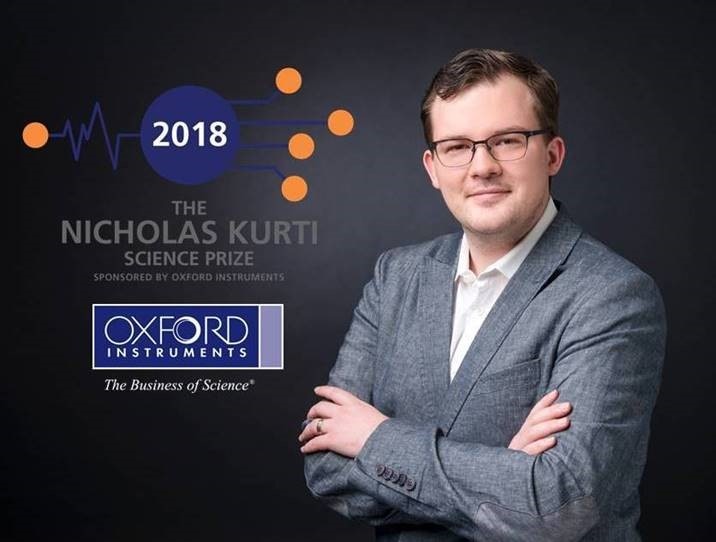Oxford Instruments is delighted to announce Dr Philip Moll of Max Plank Institute for Chemical Physics of Solids in Dresden, Germany – as the winner of the 2018 Nicholas Kurti Science Prize for Europe. His research group, ‘microstructured quantum materials’ (mqm), is currently transitioning to the Institute of Materials at EPFL, Switzerland.

Dr Moll is recognised for leading the development of novel micro-structuring techniques, allowing the fabrication of bespoke devices and experiments from complex quantum materials, and thereby enabling entirely new classes of low temperature and high magnetic field measurements.
Quantum matter describes those materials where unusual electronic correlations or topological defects in the band structure give rise to macroscopic quantum phenomena. Dr Moll’s research group is particularly interested in the behavior of quantum materials on the mesoscale, when the sample dimensions become comparable to the intrinsic length-scale of the material.
Dr Philip Moll has developed a series of experimental protocols and tricks that has enabled him to conduct a series of stunning experiments in topological physics, electronic hydrodynamics and superconductivity. All of these are major firsts in this field which is truly an outstanding achievement for a young scientist.
“I am most grateful that the panel has honoured my group’s research with this award. We aim to explore how the shape and size of complex materials lead to new behaviour and possibly applications. In this work, curiosity is what motivates my team to challenge our current understanding by creating new shapes from single crystal materials. The outstanding mqm-team, and our wonderful collaborators, have made these projects possible", commented Dr Moll.
The winner will be formally presented with the Nicholas Kurti Science Prize trophy at one of upcoming conferences, where he will present his award-winning research work.
The Nicholas Kurti Science Prize selection committee was very pleased to recognise the winner’s efforts in quantum physics. The committee consists of leading European physicists, chaired by Professor George Pickett, Lancaster University, UK.
The objective of the Nicholas Kurti Science Prize is to promote and recognise the novel work of young scientists working in the fields of low temperatures and high magnetic fields within Europe. Oxford Instruments is aware that there is a critical and often difficult stage for many such researchers between completing their PhD and gaining a permanent research position. The company has therefore been helping individuals who are producing innovative work by offering assistance both financially and through promotion of their research work, through sponsoring the Nicholas Kurti Science Prize for over 10 years, together with other such prizes for research in physical science in the Americas, Japan, China and India. The Nicholas Kurti Science Prize is named in honour of the late Professor Nicholas Kurti (1908-1998). Professor Kurti is known for his distinguished work in ultra-low temperature physics at the Clarendon Laboratory, University of Oxford, UK which during his career earned the name “the coldest spot on earth” as a consequence of the ground-breaking research conducted there; using adiabatic demagnetisation Professor Kurti was able to create temperatures of a millionth of a degree above absolute zero.
More information on all the Science Prizes supported by Oxford Instruments can be found at: www.oxford-instruments.com/scienceprize
The previous winners of the Nicholas Kurti Science Prize are Professor Dr Alexander Ako Khajetoorians, Dr Lapo Bogani, Professor Ronald Hanson, Professor Mathias Kläui, Professor Dr Christian Rüegg, Professor John Morton, Professor Lieven Vandersypen, Professor Kostya Novoselov, Professor Andreas Wallraff, Dr Silvano De Franceschi, Dr Isabel Guillamón, Dr Andrea Caviglia, Dr Francois Parmentier and Dr Erwann Bocquillon.